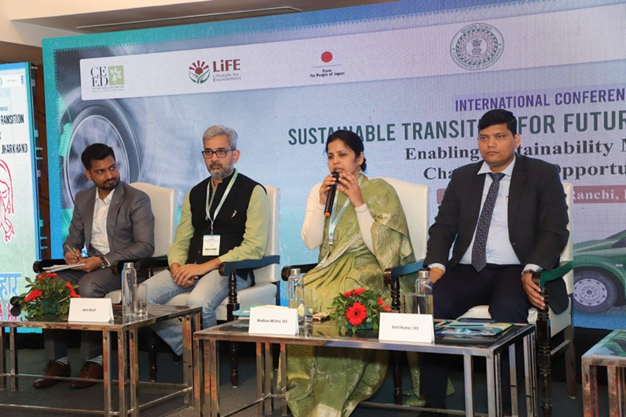
WRI India, in collaboration with Government of Jharkhand, Center for Environment and Energy Development (CEED), and United Nations Development Programme (UNDP) organised a conference on ‘Sustainable Transition for Future-Ready Jharkhand: Global Perspectives and Learnings for Climate Resilient Growth’ on February 14-15, 2024, in Ranchi, Jharkhand.

Balaji R, Senior Programme Manager, Electric Mobility, Shakti, moderated a session on ‘Revolutionising Transport: Steering Towards Sustainable Mobility’ at the two days International Conference. During the session, Shri Amit Kumar, IAS, Director-SUDA, highlighted Jharkhand’s efforts towards low emission zones (LEZs) and the inclusion of sustainable and low-carbon mobility aspects in urban planning. Srimati Madhavi Mishra, IAS, MD-JIIDCO, Department of Industries, discussed the government of Jharkhand’s initiatives to establish the state as a leading hub for electric vehicles and green hydrogen manufacturing in Eastern India.
The primary objective of the conference was to facilitate the exchange of knowledge and experiences to advocate for climate-resilient growth and sustainable energy transition, while upholding principles of justice and equity. It aimed to provide a platform for diverse perspectives, ranging from policymakers shaping frameworks to industry leaders driving innovation, and communities affected by these transformations. The event convened high-level officials from governments, international organisations, philanthropic entities, industries, business associations, investors, innovators, scholars, and experts worldwide to deliberate on navigating the dynamic landscape of challenges and opportunities.
At the heart of the conference were several key objectives:
- Facilitating the sharing of global best practices and experiences in transitioning to sustainable energy from both the Global North and South.
- Discussing the socio-economic impacts of low-carbon strategies to maximize co-benefits for communities.
- Fostering collaboration and partnership among various stakeholders and enablers to drive a paradigmatic shift towards sustainable energy solutions.
- Exploring policy frameworks aimed at strengthening capacity and governance for the effective implementation of sustainable energy strategies.
- Through these objectives, the conference endeavored to catalyse meaningful dialogue and action towards a more sustainable and equitable energy future.
